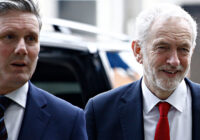Is there a scale to measure racism in Britain? It appears there may be two.
British politics being what it is (and brave is the person who dares to define it), the political stories that grab the headlines day after day tend to be both confusing and confounding. Brexit of course dominates everything. But the other stories tend to conform to Brexit’s dualistic logic: it’s “yes” or “no.” You may be for or against, but don’t even think about nuance. That only becomes an issue once you have committed to one side or the other and we start dealing with a parade of unintended consequences.
When it isn’t yes vs. no, it’s good vs. evil, as the ongoing drama around anti-Semitism in the Labour Party reveals. Though the trend is to make a final pronouncement on the basis of a binary choice — deciding whether Labour’s current leadership is or isn’t anti-Semitic — to reach that decision, given the ambiguity of human intentions, a threshold or tipping point must be defined. And so we read in The Guardian: “Leaked Labour disciplinary papers have laid bare the scale of the challenge the party’s governing body faces in tackling antisemitism.”
Here is today’s 3D definition:
Scale:
Technically a range of values between two extremes, but when cited concerning something controversial it signifies “beyond the danger point”
Contextual note
For any measurable phenomenon, a “scale” exists between absence and total dominance. When a journalist uses the cliché “laid bare the scale,” the meaning of scale changes. It means “a huge amount” or “a high level.” It signals drama that’s worth reading about.
To illustrate the drama, The Guardian offers us three examples — one about its being “a ‘badge of honour’ to be investigated by the party,” another blaming the Israeli lobby for the party’s anti-Semitism crisis, and a third “suggesting Adolf Hitler’s policy on Zionism ‘might not be mutually exclusive with his later actions.’” The last two are a kind of historical speculation that may or may not correspond to reality, but are clearly not expressions of racial or ethnic hatred. The first one is essentially about rivalry, power and influence relationships within the Labour Party itself.
At least on the surface, none of this appears to be anti-Semitism, but the last two express a severe unease about the history of Zionism and the possible consequences of current Israeli lobbying. Is it anti-Semitic to suspect that a lobby might be using a variety of means to influence people’s perception?
There may be examples of remarks by Labour politicians akin to Mel Gibson’s drunken “The Jews are responsible for all the wars in the world!” (It would have been more accurate to claim that the Brits are responsible for all the wars in the world, since they drew most of the contested borders in world.) But The Guardian doesn’t cite them, hinting only at “grotesque antisemitism, including Holocaust denial” and then quoting without critiquing party leader Jeremy Corbyn’s estimate of “0.1% of Labour’s membership of more than half a million.” And yet the tenor of the article highlights the “scale laid bare” of anti-Semitism across the entire Labour Party. By definition, parties are randomly associated collections of a wide diversity of people with an even wider diversity of specific opinions about the widest diversity of issues. There will always be individuals ranting like Gibson.
Historical note
If Labour is struggling to maintain its dignity because some of its more obscure members have made remarks construed as anti-Semitic, the Tories have suddenly found themselves confronted by a similar drama, whose source, in contrast to Labour, is at the very top: from the man considered most likely to succeed Theresa May as prime minister, Boris Johnson. Undoubtedly inspired by the electoral success of Donald Trump in the US, Johnson has pushed to center stage his already documented xenophobic and specifically Islamophobic populism.
 The Guardian describes the defensive reaction of some Tories, such as former Attorney General Dominic Grieve who called Johnson’s Islamophobia “very embarrassing.” Prime Minister May called Johnson’s remarks “offensive.” Grieve reflected, “If it goes on long enough then probably the foundations of our democracy will be in danger.”
The Guardian describes the defensive reaction of some Tories, such as former Attorney General Dominic Grieve who called Johnson’s Islamophobia “very embarrassing.” Prime Minister May called Johnson’s remarks “offensive.” Grieve reflected, “If it goes on long enough then probably the foundations of our democracy will be in danger.”
In other words, the implications go far beyond the local disciplinary problem of Labour. But even The Guardian appears to believe that a party leader’s outright Islamophobia — Johnson once called it a “natural reaction” — cannot merit the “scale” of outrage provoked by criticism of Zionist lobbying among low level members of the Labour Party.
Johnson could be the next prime minister. His popularity among Conservative voters has “quadrupled since leaving office and put him at the top of favoured successors to May.” Trump has built racism and Islamophobia into the policy orientation of the federal government in the US, where criticism of Israel is considered lèse-majesté.
One is left wondering: Is the underlying historical logic of Brexit, the liberation of the UK from its slavery to Europe, the Trumpization of Britain?
*[In the age of Oscar Wilde and Mark Twain, another American wit, the journalist Ambrose Bierce, produced a series of satirical definitions of commonly used terms, throwing light on their hidden meanings in real discourse. Bierce eventually collected and published them as a book, The Devil’s Dictionary, in 1911. We have shamelessly appropriated his title in the interest of continuing his wholesome pedagogical effort to enlighten generations of readers of the news.]
The views expressed in this article are the author’s own and do not necessarily reflect Fair Observer’s editorial policy.
Photo Credit: Victoria M Gardner / Shutterstock.com
Support Fair Observer
We rely on your support for our independence, diversity and quality.
For more than 10 years, Fair Observer has been free, fair and independent. No billionaire owns us, no advertisers control us. We are a reader-supported nonprofit. Unlike many other publications, we keep our content free for readers regardless of where they live or whether they can afford to pay. We have no paywalls and no ads.
In the post-truth era of fake news, echo chambers and filter bubbles, we publish a plurality of perspectives from around the world. Anyone can publish with us, but everyone goes through a rigorous editorial process. So, you get fact-checked, well-reasoned content instead of noise.
We publish 2,500+ voices from 90+ countries. We also conduct education and training programs
on subjects ranging from digital media and journalism to writing and critical thinking. This
doesn’t come cheap. Servers, editors, trainers and web developers cost
money.
Please consider supporting us on a regular basis as a recurring donor or a
sustaining member.
Will you support FO’s journalism?
We rely on your support for our independence, diversity and quality.






